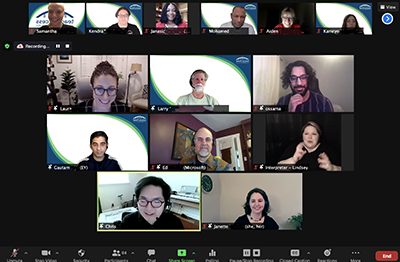
Because of the COVID-19 pandemic, the Teach Access Study Away program was held virtually each Wednesday from March 17-April 21, 2021 for one and a half hours. Eighty-two students participated from nine different universities, including six AccessComputing Institutional Partners: University of Washington, University of Southern California, Rochester Institute of Technology, California State University, Northridge, University of Colorado Boulder, and University of Maryland. The purpose of this program is to bring together students, faculty, advocacy groups, and industry partners to explore the field of accessible technology design and development. The program consisted of presentations and panels aimed at helping students understand disability and accessibility. Companies that participated included Apple, Ernst & Young Global Limited (EY), Facebook, Google, Linkedin, Microsoft, Spotify, Verizon, Verizon Media, and Walmart. Advocacy groups that participated included the American Association of People with Disabilities (AAPD), Autistic Self Advocacy Network (ASAN), Hearing Loss Association of America (HLAA), National Association of the Deaf (NAD), and American Foundation for the Blind (AFB). Topics of presentations and panels included accessibility and design, accessibility and innovation, inclusive marketing, careers in accessibility, accessibility research, and lessons from advocates. During the program, there was plenty of time for students to ask questions. Former AccessComputing Team member Chris Yoon, now at Microsoft, was one of the organizers who planned the program.

After the program, teams were formed to participate in Accessathon, an event where the teams worked on designing and building prototypes to solve accessibility problems. The participating teams were recognized on May 20, 2021 for Global Accessibility Awareness Day (GAAD). Four teams, totaling 24 students, completed their projects and prepared videos to describe their results. The projects included the design of an indoor navigation app, a survey on mental health and accessibility, and a collaborative note taking app. The winning project was an innovative and more inclusive classroom communication tool that would be more equitable than simply raising hands to be recognized in the classroom. AccessComputing partner representative from the University of Southern California, Kendra Walther, was one of the organizers of Accessathon.